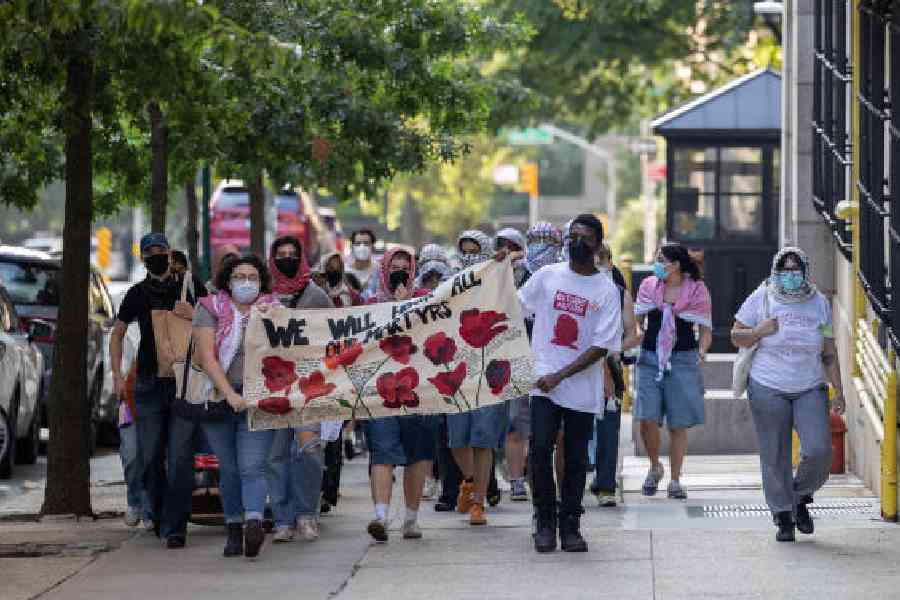The Cracked Mirror: A real world lesson for student activists


The encampments have been cleared; campuses have emptied; protester and counterprotester alike have moved on to internships, summer gigs and in some cases, the start of their postgraduate careers.
Leaving aside what impact, if any, the protests had on global events, let’s consider the more granular effect the protests will have on the protesters’ job prospects and careers.
Certainly, that matters too. After all, this generation is notable for its high levels of ambition. It has tuition price tags to justify and loans to repay. A 2023 survey of seniors of Princeton University, US, found that 60 per cent took jobs in finance, consulting, tech and engineering, up from 53 per cent in 2016.
A desire to protect future professional plans no doubt factored into the protesters’ cloaking themselves in masks and kaffiyehs. According to a report in The New York Times, “The fear of long-term professional consequences has also been a theme among pro-Palestine protesters”.
Activism has played a big part of many of these young people’s lives and academic success. From the children’s books they read (The Hate U Give, I Am Malala), to the young role models who were honoured, (Greta Thunberg, David Hogg), to the social justice movements that were praised (Black Lives Matter, MeToo, climate justice), Gen Zers have been told it’s on them to clean up the boomers’ mess. Resist!
College application essays in the US regularly ask students to describe their relationship with social justice, their leadership experience and their pet causes. “Where are you on your journey of engaging with or fighting for social justice?” asked one essay prompt Tufts University, US, offered applicants in 2022. What are you doing to ensure the planet’s future?
Across the curriculum, from social sciences to humanities, courses are steeped in social justice theory and calls to action. Cornell University’s library publishes a study guide to a 1969 building occupation in which students armed themselves. Harvard offers a social justice graduate certificate. Imagine the surprise of one freshman who was expelled from Vanderbilt University after students forced their way into an administrative building.
Things could still work out well for many of these kids. Some professions — academia, politics, community organising, nonprofit work — are well served by a resume brimming with activism. But a lot has changed socially and economically since boomer activists marched from the streets to the workplace, many of them building solid middle-class lives as teachers, creatives and professionals, without crushing anxiety about student debt. In a demanding and rapidly changing economy, today’s students yearn for the security of high-paying employment.
Not all employers will look kindly on an encampment stint. When a group of Harvard student organisations signed an open letter blaming Israel for Hamas’ October 7 attacks, billionaire Bill Ackman requested on the social platform X that Harvard release the names of the students involved “so as to insure (sic) that none of us inadvertently hire any of their members”. Soon after, a conservative watchdog group posted names and photos of the students on a truck circling Harvard Square.
Calling students out for their political beliefs is admittedly creepy. But Palestinian demonstrations lacked the moral clarity of the anti-apartheid demonstrations. Along with protesters demanding that Israel stop killing civilians in the Gaza Strip, others stirred fears of antisemitism by justifying the October 7 massacre, tearing down posters of kidnapped Israelis, shoving “Zionists” out of encampments and calling for “globalising the intifada”.
In November, two dozen leading law firms wrote to top law schools implying that students who participated in what they called antisemitic activities, including calling for “the elimination of the state of Israel”, would not be hired. More than 100 firms have since signed on. One of those law firms, Davis Polk, rescinded job offers to students whose organisations had signed the letter Ackman criticised.
Two partners at corporate law firms, who asked to speak anonymously, said that participating in this year’s protests, especially if it involves an arrest, could easily foreclose opportunities at their firm. At one of those firms, hiring managers scan applicants’ social media histories for problems.
Also, employers want to hire people who can get along and fit into their company culture, rather than trying to agitate for change. They don’t want politics disrupting the workplace. What flies on campus doesn’t necessarily pass in the real world.
The toughest lesson for people of this generation may be that while they’ve been raised to believe in their right to change the world, the rest of the world may neither share nor be ready to indulge their particular vision.
NYTNS